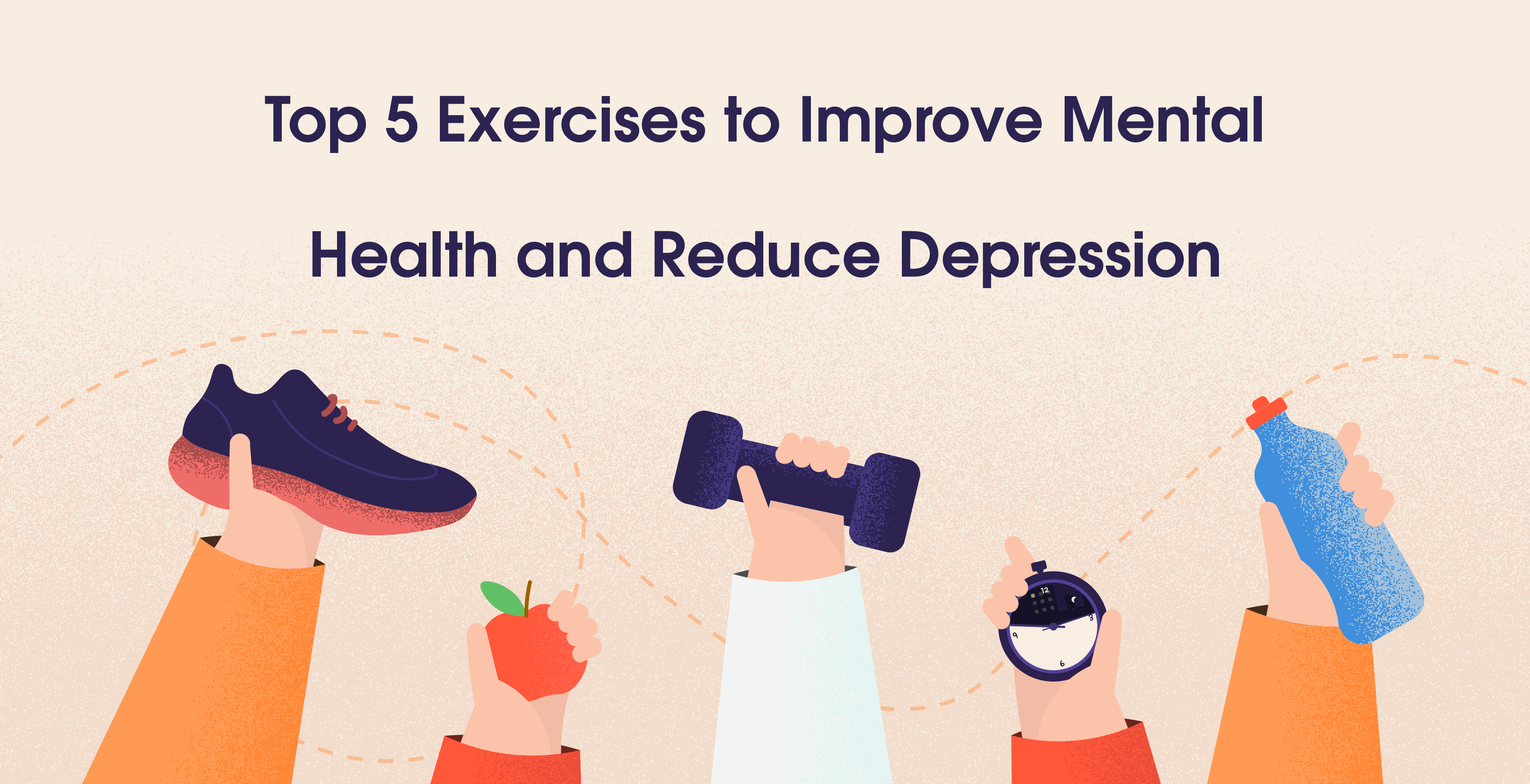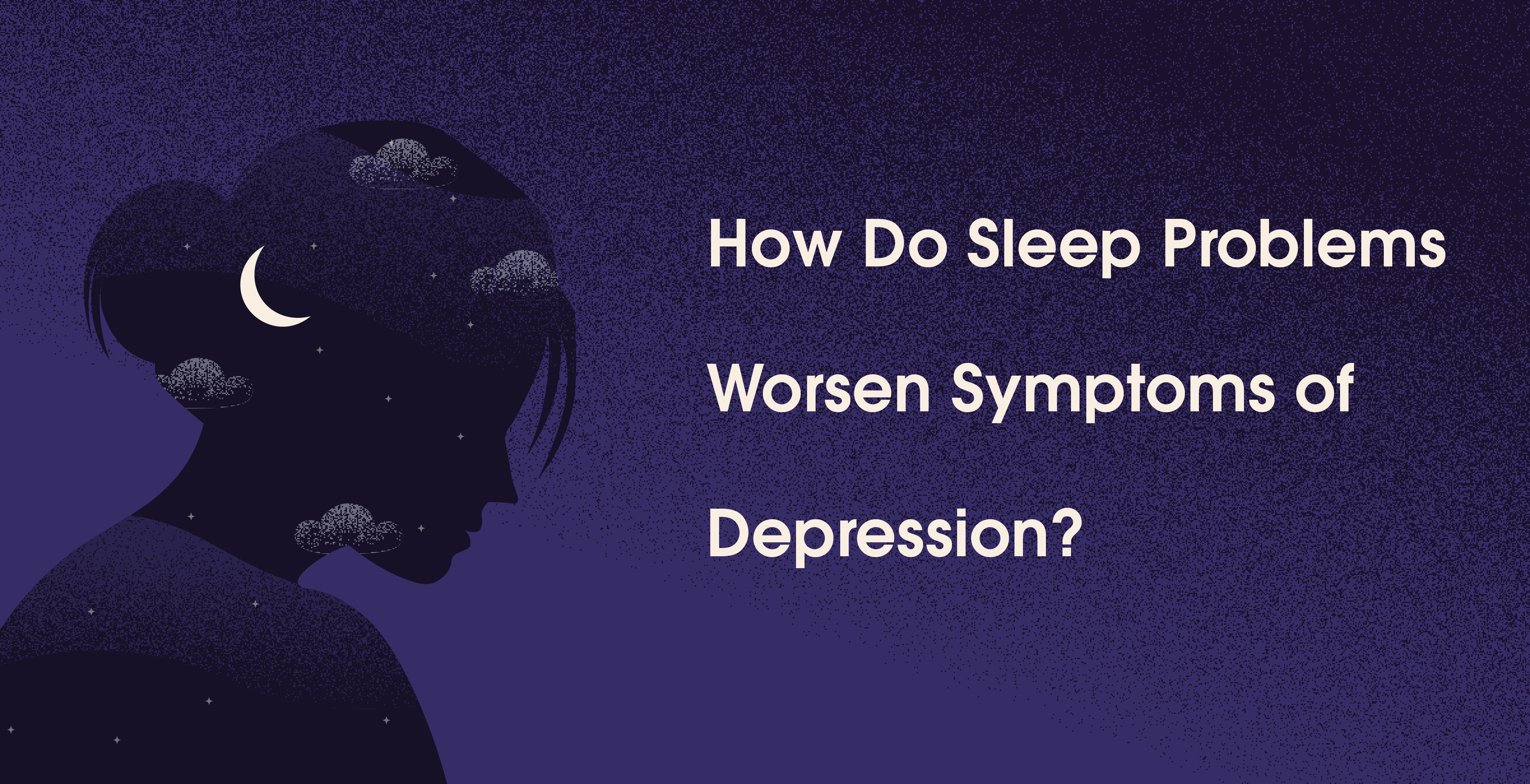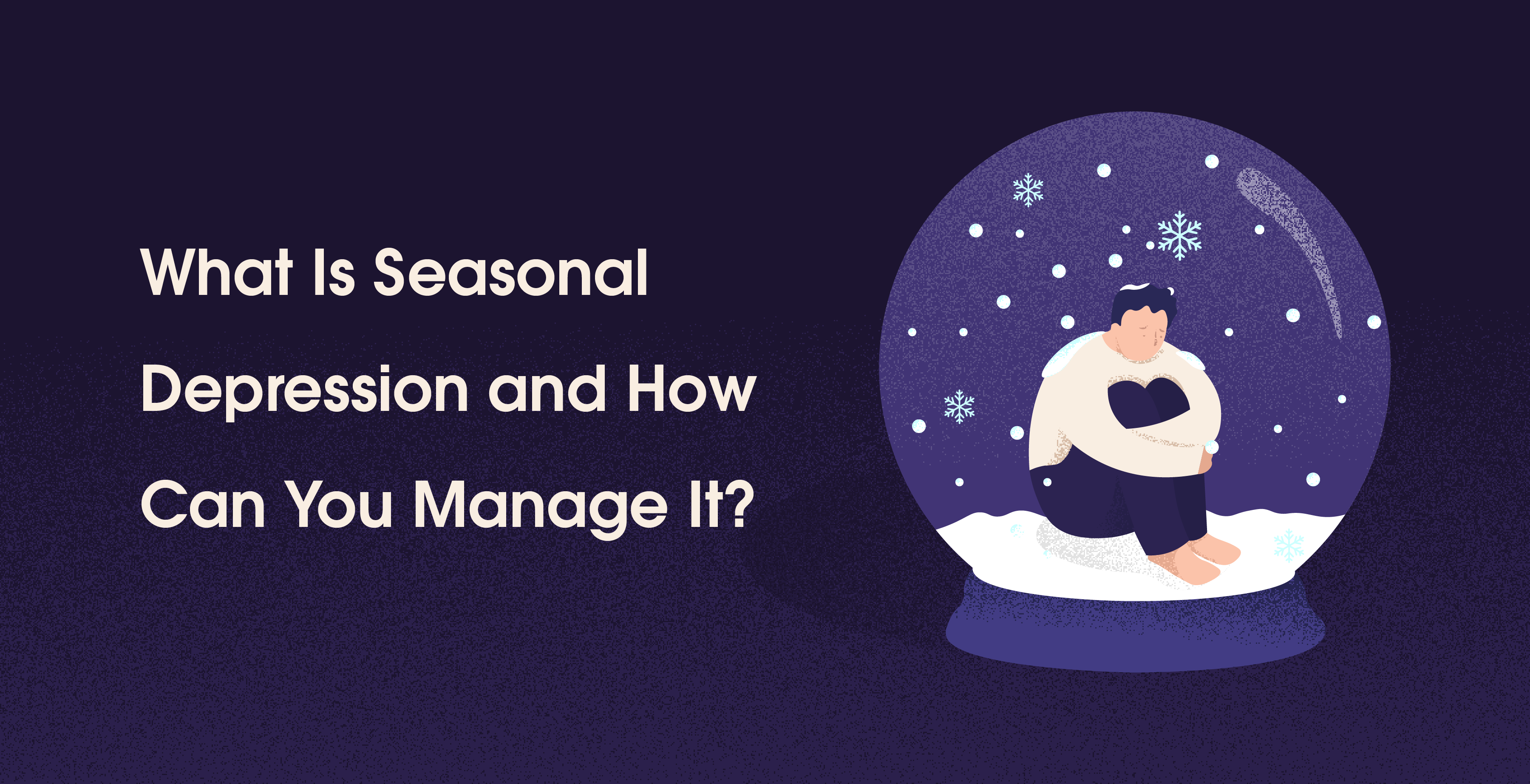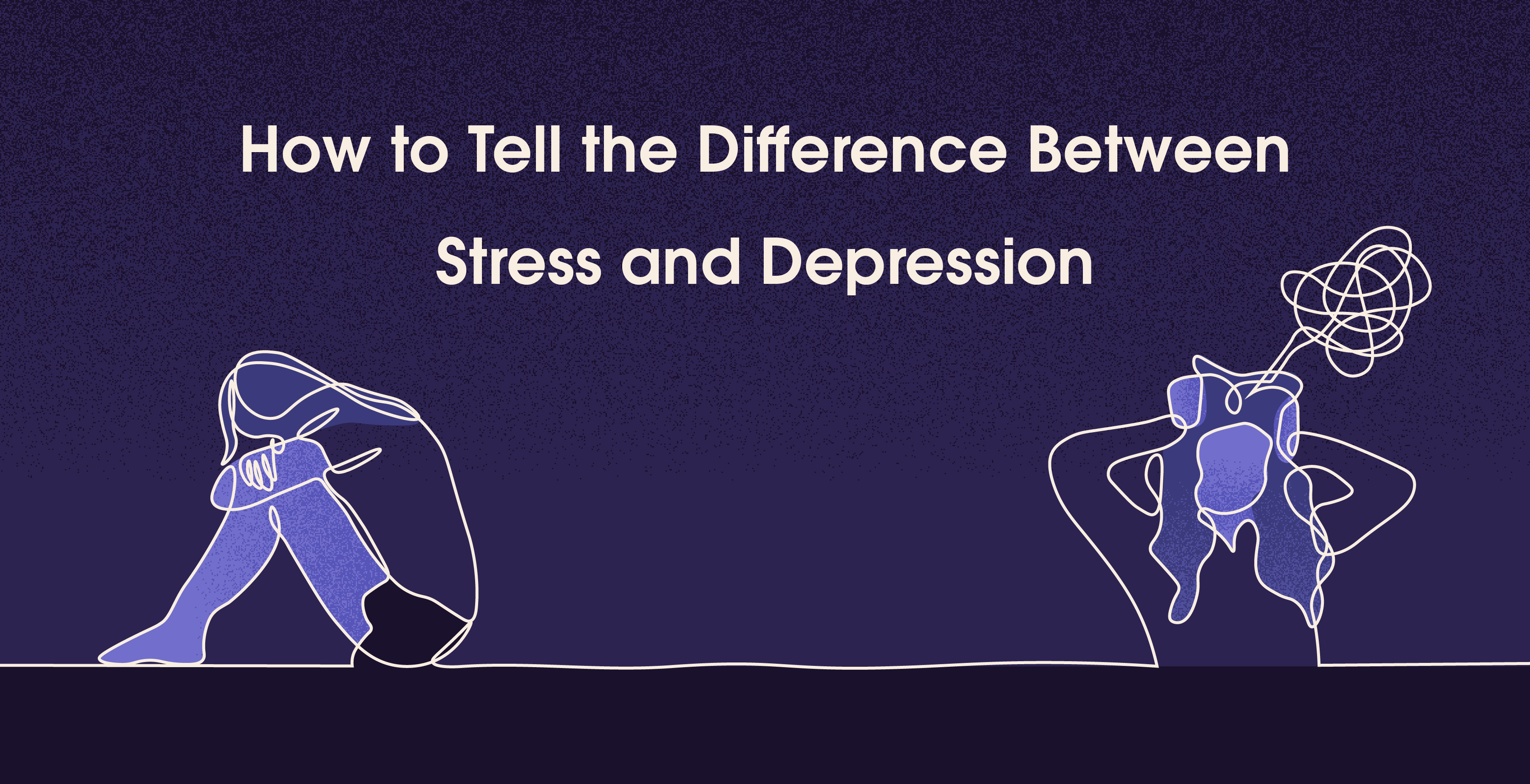Top 5 Exercises to Improve Mental Health and Reduce Depression
Jan 28, 2025
Sayfali Rawlani



Table Of Contents
Life can be a rollercoaster. Between work stress, family commitments, and trying to stay afloat in a sea of responsibilities, mental health often takes a backseat. But here’s the deal: taking care of your mind is just as crucial as taking care of your body. And guess what? Exercise is the secret sauce that ties both together. Not only does it boost your mood, but it can also give depression a good old kick to the curb. So, without further ado, here are five exercises that can help improve your mental health and reduce those pesky depressive feelings.
Highlights
Walking offers a simple yet powerful way to clear mental cobwebs, connect with nature, and boost mood.
Yoga combines physical movement, controlled breathing, and mindfulness, offering a calming effect and grounding the mind.
Running acts as moving meditation, releasing stress and providing a natural "runner’s high."
Dancing lifts spirits by blending cardio with joy, offering a fun way to shake off stress.
Strength training builds physical resilience and mental confidence, encouraging perseverance and releasing endorphins.
Exercise reconnects the mind and body, releasing mood-boosting endorphins and promoting consistency over perfection.
Movement, in any form, serves as a powerful tool for mental health, reminding individuals of their strengths and fostering a healthier outlook.
Top 5 Exercises That Is Good To Improve Mental Health and Reduce Depression
Walking
Simple, isn’t it? But don’t underestimate the magic of a good walk. Whether it’s a leisurely stroll in the park or a brisk power walk around your neighborhood, walking can do wonders for your mental health. The rhythmic movement of putting one foot in front of the other has a calming effect on your brain. Plus, being outdoors, surrounded by nature, feels like therapy minus the couch.
Imagine this: you’re walking through a tree-lined path, the sun peeking through the leaves, birds chirping somewhere in the distance. Suddenly, that overwhelming cloud in your head starts to feel lighter. That’s the beauty of walking—it clears the mental cobwebs. So, pop on your sneakers, grab some headphones, and take a walk. Bonus points if you can rope in a friend or two—it’s like a moving support group.
Yoga
If there’s one exercise that screams zen, it’s yoga. This ancient practice isn’t just about striking Instagram-worthy poses—it’s about finding balance, both inside and out. Yoga works wonders by combining physical movement, controlled breathing, and mindfulness. And let’s not forget about the endorphins—those feel-good chemicals that make you want to smile for no reason.
When you’re holding a Warrior II pose, with your arms stretched wide and your focus locked in, you’re not just strengthening your body—you’re grounding your mind. The best part? Yoga is for everyone. Whether you’re a total newbie or someone who can twist into a human pretzel, there’s a yoga style that’ll suit you. And that feeling of calm after a good session? Priceless.
Running
Now, before you roll your eyes at the thought of running, hear me out. You don’t need to be a marathoner to experience the mental health perks of this activity. Running is like a moving meditation—it gets your heart pumping, clears your head, and helps you release pent-up emotions. Ever heard of the “runner’s high”? It’s real, and it’s glorious.
Picture this: you’re running along a quiet path, the rhythmic thud of your feet syncing with your breath. With every stride, you’re leaving behind stress, anger, or that nagging sense of sadness. Suddenly, you feel… lighter. That’s the magic of running—it’s not just exercise; it’s therapy in motion. And hey, no one’s judging your pace. Whether you’re sprinting or jogging, it’s all about showing up.
Dancing
Feeling low? Crank up your favorite playlist and dance like no one’s watching. Seriously, dancing is one of the most joyful ways to lift your spirits. It’s like a double-whammy—cardio for your body and pure happiness for your soul. Plus, it’s hard to feel down when you’re grooving to your favorite beats.
Dancing doesn’t need to be formal. You don’t have to sign up for a salsa class (unless you want to). Just turn your living room into a makeshift dance floor and let loose. Let the music guide you, whether it’s a high-energy hip-hop track or a soothing ballad. Dancing reminds you to have fun, even if it’s just for a few minutes. And let’s be honest, sometimes a good shimmy is all you need to turn your day around.
Strength Training
When people think of mental health exercises, weightlifting isn’t usually the first thing that comes to mind. But here’s the kicker—strength training isn’t just about building biceps; it’s about building resilience. When you challenge your body with weights, you’re also training your mind to push through discomfort and doubt.
Think of it this way: when you’re lifting something heavy, you’re telling yourself, I’ve got this. And that confidence? It spills over into other areas of your life. Strength training also helps release endorphins, reducing stress and anxiety. Plus, seeing yourself get stronger over time is a massive confidence booster. It’s like saying, “If I can lift this, I can handle anything life throws at me.”
Why Exercise Works Wonders for the Mind
Exercise isn’t a magic cure for mental health challenges, but it’s a powerful tool in your wellness toolkit. It helps you reconnect with your body, release tension, and find moments of peace in an otherwise chaotic world. And it’s not just about the physical act of moving—it’s about what happens in your brain when you do. Those mood-boosting endorphins are like your personal cheerleaders, reminding you that you’ve got this.
But let’s keep it real—not every day is going to be a gym day. And that’s okay. The goal isn’t perfection; it’s consistency. Maybe today you feel like doing yoga, and tomorrow you just want to take a short walk. What matters is that you’re showing up for yourself, one step (or pose, or lift) at a time.
Final Thoughts
Life isn’t always sunshine and rainbows. Sometimes, it’s just plain hard. But incorporating movement into your daily routine can make a world of difference. Whether you’re walking, running, dancing, or hitting the gym, these activities remind you of your strength—both physical and mental.
So, start small. Lace up your shoes, roll out your yoga mat, or press play on that dance playlist. Your mental health will thank you for it. And remember, you’re not just moving your body—you’re moving closer to a healthier, happier you. Now, go get moving—you’ve got this!
References
Life can be a rollercoaster. Between work stress, family commitments, and trying to stay afloat in a sea of responsibilities, mental health often takes a backseat. But here’s the deal: taking care of your mind is just as crucial as taking care of your body. And guess what? Exercise is the secret sauce that ties both together. Not only does it boost your mood, but it can also give depression a good old kick to the curb. So, without further ado, here are five exercises that can help improve your mental health and reduce those pesky depressive feelings.
Highlights
Walking offers a simple yet powerful way to clear mental cobwebs, connect with nature, and boost mood.
Yoga combines physical movement, controlled breathing, and mindfulness, offering a calming effect and grounding the mind.
Running acts as moving meditation, releasing stress and providing a natural "runner’s high."
Dancing lifts spirits by blending cardio with joy, offering a fun way to shake off stress.
Strength training builds physical resilience and mental confidence, encouraging perseverance and releasing endorphins.
Exercise reconnects the mind and body, releasing mood-boosting endorphins and promoting consistency over perfection.
Movement, in any form, serves as a powerful tool for mental health, reminding individuals of their strengths and fostering a healthier outlook.
Top 5 Exercises That Is Good To Improve Mental Health and Reduce Depression
Walking
Simple, isn’t it? But don’t underestimate the magic of a good walk. Whether it’s a leisurely stroll in the park or a brisk power walk around your neighborhood, walking can do wonders for your mental health. The rhythmic movement of putting one foot in front of the other has a calming effect on your brain. Plus, being outdoors, surrounded by nature, feels like therapy minus the couch.
Imagine this: you’re walking through a tree-lined path, the sun peeking through the leaves, birds chirping somewhere in the distance. Suddenly, that overwhelming cloud in your head starts to feel lighter. That’s the beauty of walking—it clears the mental cobwebs. So, pop on your sneakers, grab some headphones, and take a walk. Bonus points if you can rope in a friend or two—it’s like a moving support group.
Yoga
If there’s one exercise that screams zen, it’s yoga. This ancient practice isn’t just about striking Instagram-worthy poses—it’s about finding balance, both inside and out. Yoga works wonders by combining physical movement, controlled breathing, and mindfulness. And let’s not forget about the endorphins—those feel-good chemicals that make you want to smile for no reason.
When you’re holding a Warrior II pose, with your arms stretched wide and your focus locked in, you’re not just strengthening your body—you’re grounding your mind. The best part? Yoga is for everyone. Whether you’re a total newbie or someone who can twist into a human pretzel, there’s a yoga style that’ll suit you. And that feeling of calm after a good session? Priceless.
Running
Now, before you roll your eyes at the thought of running, hear me out. You don’t need to be a marathoner to experience the mental health perks of this activity. Running is like a moving meditation—it gets your heart pumping, clears your head, and helps you release pent-up emotions. Ever heard of the “runner’s high”? It’s real, and it’s glorious.
Picture this: you’re running along a quiet path, the rhythmic thud of your feet syncing with your breath. With every stride, you’re leaving behind stress, anger, or that nagging sense of sadness. Suddenly, you feel… lighter. That’s the magic of running—it’s not just exercise; it’s therapy in motion. And hey, no one’s judging your pace. Whether you’re sprinting or jogging, it’s all about showing up.
Dancing
Feeling low? Crank up your favorite playlist and dance like no one’s watching. Seriously, dancing is one of the most joyful ways to lift your spirits. It’s like a double-whammy—cardio for your body and pure happiness for your soul. Plus, it’s hard to feel down when you’re grooving to your favorite beats.
Dancing doesn’t need to be formal. You don’t have to sign up for a salsa class (unless you want to). Just turn your living room into a makeshift dance floor and let loose. Let the music guide you, whether it’s a high-energy hip-hop track or a soothing ballad. Dancing reminds you to have fun, even if it’s just for a few minutes. And let’s be honest, sometimes a good shimmy is all you need to turn your day around.
Strength Training
When people think of mental health exercises, weightlifting isn’t usually the first thing that comes to mind. But here’s the kicker—strength training isn’t just about building biceps; it’s about building resilience. When you challenge your body with weights, you’re also training your mind to push through discomfort and doubt.
Think of it this way: when you’re lifting something heavy, you’re telling yourself, I’ve got this. And that confidence? It spills over into other areas of your life. Strength training also helps release endorphins, reducing stress and anxiety. Plus, seeing yourself get stronger over time is a massive confidence booster. It’s like saying, “If I can lift this, I can handle anything life throws at me.”
Why Exercise Works Wonders for the Mind
Exercise isn’t a magic cure for mental health challenges, but it’s a powerful tool in your wellness toolkit. It helps you reconnect with your body, release tension, and find moments of peace in an otherwise chaotic world. And it’s not just about the physical act of moving—it’s about what happens in your brain when you do. Those mood-boosting endorphins are like your personal cheerleaders, reminding you that you’ve got this.
But let’s keep it real—not every day is going to be a gym day. And that’s okay. The goal isn’t perfection; it’s consistency. Maybe today you feel like doing yoga, and tomorrow you just want to take a short walk. What matters is that you’re showing up for yourself, one step (or pose, or lift) at a time.
Final Thoughts
Life isn’t always sunshine and rainbows. Sometimes, it’s just plain hard. But incorporating movement into your daily routine can make a world of difference. Whether you’re walking, running, dancing, or hitting the gym, these activities remind you of your strength—both physical and mental.
So, start small. Lace up your shoes, roll out your yoga mat, or press play on that dance playlist. Your mental health will thank you for it. And remember, you’re not just moving your body—you’re moving closer to a healthier, happier you. Now, go get moving—you’ve got this!
References
Table Of Contents
Table Of Contents
Table Of Contents
Read More


Mar 28, 2025
Sayfali Rawlani


Feb 6, 2025
Sayfali Rawlani


Jan 24, 2025
Sayfali Rawlani



Company
Copyright © 2025 trst health. All right reserved.

